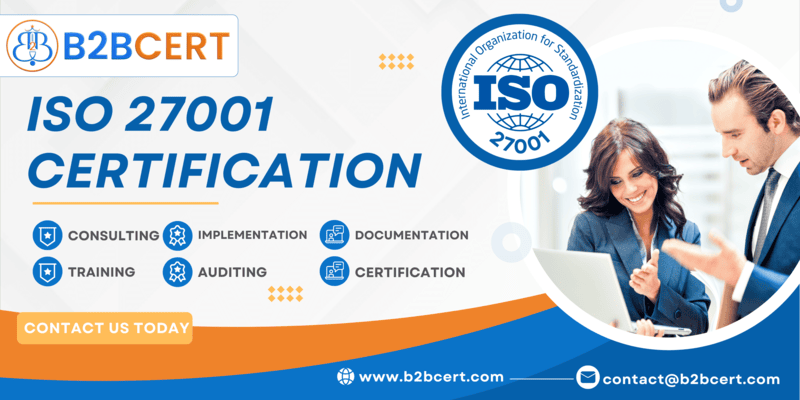ISO 27001 Certification is an internationally recognized standard for information security management systems (ISMS), designed to help organizations protect sensitive data, manage information security risks, and ensure compliance with global standards. In an era of increasing cyber threats and data breaches, ISO 27001 Certification in Kuwait is essential for businesses across Kuwait, particularly in industries such as banking, healthcare, government, and IT. It demonstrates a commitment to securing data, minimizing risk, and fostering customer trust, which is vital for maintaining a competitive edge.
Understanding ISO 27001 Certification
ISO 27001 provides a framework that guides organizations in setting up, implementing, maintaining, and continuously improving an ISMS. The standard outlines best practices for data security, including risk assessment, information classification, data handling, and continuous monitoring. Unlike traditional security measures that focus on technology alone, ISO 27001 takes a holistic approach, integrating people, processes, and IT to address security risks effectively.
For organizations in Kuwait, ISO 27001 Certification offers a structured approach to information security that aligns with both local regulatory requirements and international standards, ensuring that data protection practices meet high benchmarks.
Benefits of ISO 27001 Certification for Kuwaiti Businesses
Achieving ISO 27001 Certification brings numerous advantages, including:
-
Enhanced Data Security: ISO 27001 Implementation in Kuwait helps organizations implement controls to protect sensitive information, reducing the risk of data breaches and cyberattacks.
-
Customer Trust and Credibility: Certification demonstrates a company’s commitment to safeguarding data, which is particularly important for clients and partners who prioritize security.
-
Regulatory Compliance: ISO 27001 aligns with privacy and security regulations, such as the European GDPR or GCC data protection laws, helping businesses comply with legal requirements.
-
Risk Management and Reduction: The standard promotes a risk-based approach to data security, ensuring that vulnerabilities are identified and mitigated proactively.
-
Operational Efficiency: By streamlining security processes, ISO 27001 reduces inefficiencies, minimizes duplication, and creates a resilient framework for information management.
ISO 27001 Implementation Process
Implementing ISO 27001 requires a comprehensive approach, as it touches upon multiple areas of an organization. Below are the typical steps in the ISO 27001 implementation process:
-
Gap Analysis: Conduct a gap analysis to compare the current information security practices with ISO 27001 requirements. This assessment identifies areas for improvement and helps develop a roadmap for implementation.
-
Management Commitment and ISMS Policy Development: Top-level management must commit to the process, establishing an information security policy and objectives aligned with business goals.
-
Risk Assessment and Control Selection: Conduct a risk assessment to identify potential threats, vulnerabilities, and impacts on information security. Based on the findings, select security controls to manage and mitigate these risks.
-
Documentation and Procedures: ISO 27001 requires thorough documentation, including policies, procedures, and records, to demonstrate compliance and support effective ISMS implementation.
-
Employee Training and Awareness: Provide training to ensure employees understand security policies, procedures, and their responsibilities within the ISMS. This step is critical, as human error often poses security risks.
-
Internal Audits: Conduct internal audits to identify any gaps or non-compliance issues, allowing the organization to make necessary improvements before the official certification audit.
The implementation timeline varies depending on the size and complexity of the organization. Many businesses in Kuwait seek guidance from ISO consultants to streamline the process, as they offer expertise in documentation, risk management, and audit preparation.
The Role of Audits in ISO 27001 Certification
Audits are essential to achieving and maintaining ISO 27001 Audit in Kuwait. These audits verify that the ISMS meets ISO standards and that security controls are effectively implemented. The audit process includes two primary types:
-
Internal Audits: Conducted by the organization or an external consultant, internal audits assess the ISMS for compliance with ISO 27001. These audits allow companies to identify and address gaps, ensuring readiness for the official certification audit.
-
Certification Audit: The certification audit, performed by an accredited external auditor, occurs in two stages:
-
Stage 1 Audit: The auditor reviews the ISMS documentation, policies, and risk assessment processes to confirm that they meet ISO 27001 requirements.
-
Stage 2 Audit: The auditor evaluates the practical implementation of the ISMS, assessing controls, interviewing staff, and verifying that security measures are functioning as intended.
After passing the certification audit, the organization receives ISO 27001 Certification, which must be maintained through regular surveillance audits to ensure ongoing compliance.
Importance of ISO 27001 for Kuwaiti Businesses
In Kuwait’s rapidly evolving business landscape, where data privacy and cybersecurity are growing concerns, ISO 27001 Certification is a strategic asset. For industries such as finance, healthcare, and telecommunications, where information security is paramount, ISO 27001 provides a robust framework to safeguard sensitive data and comply with both local and international regulations.
Certification not only demonstrates a commitment to security but also enhances market credibility, helping organizations attract new clients, secure partnerships, and fulfill vendor requirements that prioritize data protection.
Choosing an ISO 27001 Consultant in Kuwait
ISO 27001 implementation is a complex process, and many organizations in Kuwait opt to work with specialized ISO consultants. These consultants assist with gap analysis, documentation, training, and audit preparation, making it easier for businesses to achieve compliance and certification.
ISO 27001 Consultants in Kuwait is an effective solution for businesses that prioritize information security. By following the ISO 27001 implementation process and meeting audit requirements, companies can establish a resilient ISMS, improve data protection, and build trust with clients and stakeholders. For Kuwaiti businesses seeking to safeguard sensitive information and maintain a competitive edge, ISO 27001 Certification offers a structured, reliable approach to information security management.
